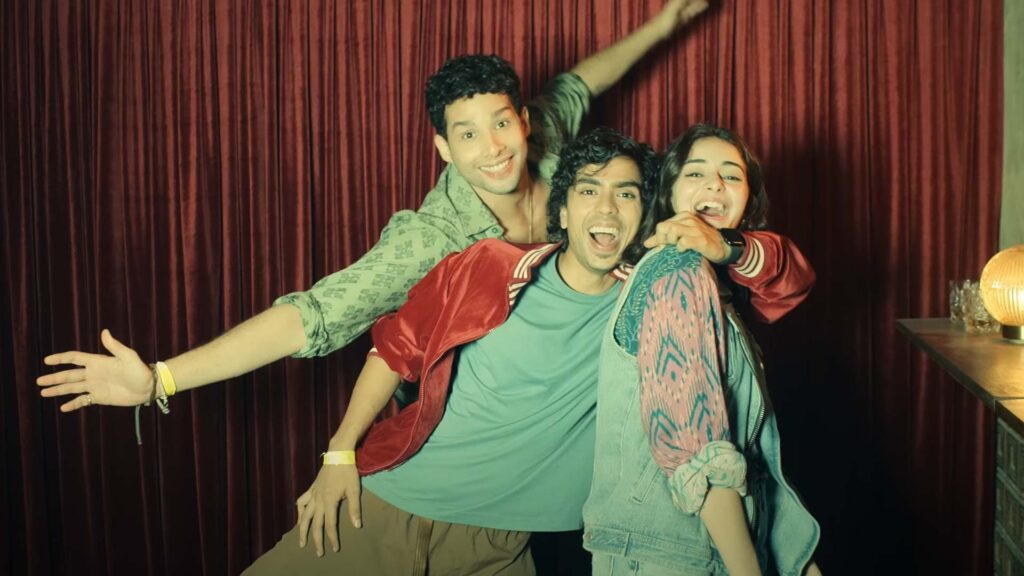Hindi Movie Review: Kho Gaye Hum Kahan taps into the zeitgeist, but doesn’t offer much fresh perspective of its own

Desperate to convince you of its youthful energy but ultimately rather old-fashioned in its presentation, Arjun Varain Singh’s Kho Gaye Hum Kahan correctly identifies a lot of the sources of social unease in contemporary life without having anything vital to say about them. This is yet another “social media movie” that seeks to reflect how disconnected we all ironically are in this age of instant, accessible communication. It’s definitely a relatable topic that will broadly resonate, but do we really need another piece of media that simply reinforces the logical conclusion that the only way to escape the matrix is to put your phone down and look around?
This is an Indian film set in Mumbai, but there are very few story particulars that couldn’t be transposed onto any digitally connected nation in 2023, which is likely part of what made it an ideal candidate for worldwide distribution on Netflix. The other part, as with most OTT releases these days, is that it could just as easily pass for a miniseries as a film; it is written and directed with the slick indistinctiveness that has become the hallmark of today’s streaming “content.”
The story focuses on a group of three twentysomething friends contending with the societal pressures stemming from social media and digital identity. Imaad (played by Siddhant Chaturvedi) is an aspiring standup comedian who spends his off-nights serial-dating under a fake identity on Tinder, hooking up with dozens of women but never committing to a relationship. Imaad’s roommate, Ahana (played by Ananya Panday), has her own romantic troubles, desperate to make her “on a break” boyfriend Rohan (played by Rohan Gurbaxani) want her back by presenting a fictitious, thriving version of herself on an Instagram-like app. Meanwhile, Imaad’s longtime best friend, Neil (played by Adarsh Gourav), languishes over his “secret” tryst with a social influencer (Anya Singh), which she clearly has no intention of turning into a real, public-facing relationship.
All three main actors are likable enough in their roles – even when their characters are acting in less-than-likable ways – that Kho Gaye Hum Kahan is never anything short of watchable. These aren’t exactly great performances, but they are totally approachable ones. They are relatable in conveying the dilemmas that the trio face in navigating a technologically-driven world where people are rarely who they seem online. That said, do these three ever come across as truly organic human beings deserving of the audience’s empathy? Not really, largely because the entire story is so schematically constructed around its themes on social media. The characters are crafted more for what they represent than as living, breathing people, which is something that Chaturvedi, Panday, and Gourav have to contend with as actors throughout.
This is not to say I’m that against films with characters whose chief function is to stand in as human conduits for larger themes. But I do feel that this type of movie has to produce more compelling meditations and/or conclusions about the topics it covers than Kho Gaye Hum Kahan ever does. As I noted earlier, the film’s ultimate “enlightening takeaway” is really just that we all need to stop allowing technology to have such control over our lives, and to try to prioritize face-to-face contact with those we value most over social media interactions. I don’t know about you, but I hardly needed a movie to tell me this in 2023. These themes didn’t even feel fresh anymore over a decade ago, when they were the primary focus of 2012’s Disconnect.
The story itself doesn’t go much of anywhere unexpected, either, as the direction of each character arc becomes pretty clear from the film’s overall stance on social media. To add some spice, there’s also a subplot involving the three friends partnering on a business venture: a fitness company fronted by Neil (a personal trainer), managed by Ahana (who isn’t putting her MBA to proper use in her day job), and financed by Imaad (a rich kid whose late mother left him savings). This appreciably enhances the stakes of the third act, but it’s hard to ever get too invested in the outcome, as it comes across as padding for the screenplay more than it does a true labor of love for the characters. Kho Gaye Hum Kahan effectively possesses sitcom-level plotting, without the jokes that really make a sitcom shine. “But I thought Imaad was a standup comic,” you may be thinking. Well, yes, but his sets are more designed to hammer home the film’s themes on social disconnection and to drum up conflict between the friends (when Imaad jokes too aggressively about Neil’s personal troubles) than to actually deliver bonafide laughs.
That all being said, I hope this review doesn’t read like a complete pan. Kho Gaye Hum Kahan may not offer any particularly insightful takeaways on social media’s role in contemporary culture, nor any truly emotional interpersonal moments between the characters. But it’s completely palatable and warm enough that it’s hard to imagine walking away from the movie feeling an active dislike towards it. I really enjoyed all three young actors, and I hope to see them again soon in more films. I should also note that the original music for the movie – from a variety of artists including OAFF-Savera, Sachin-Jigar, Ankur Tewari, Karan Kanchan, Rashmeet Kaur, and Achint – is top-notch.
If the film were split up into a miniseries on MTV ten or fifteen years ago, Kho Gaye Hum Kahan might have felt groundbreaking. But today, raising the issue of the cultural insidiousness of social media isn’t enough to sustain a story; you have to come with more to say. Never does co-writer/director Singh really achieve this, and as such, we’re left with a well-meaning movie that nonetheless feels incomplete. It’s a perfectly OK choice for Netflix streaming on an uneventful weeknight, but hardly worth seeking out in any other capacity.
Rating: ★★½ (out of ★★★★★)
Kho Gaye Hum Kahan is now streaming globally on Netflix (free for subscribers).

